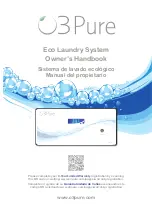
EN
7. LOADING
The maximum recommended loading quantities for bottles are given as guidelines and are indicative only; they
provide a quick estimate of the size of the appliance (similar to the capacity of a refrigerator expressed in liters).
They correspond to
tests conducted with a standard bottle: the standard “75 cl light Bordeaux” bottle -standards
apply the geographical origin of each bottle shape (Bordeaux, Burgundy, Provence, etc.) and a type (traditional,
heavy, light, flute, etc.), each with its own diameter and height.
In reality and in extreme cases, you could store more bottles by stacking the same type of bottle without using
shelves, but a varied cellar comprises a wide variety of bottles and the practical aspect of everyday cellar
management limits its capacity. You will therefore probably load the appliance a little less than the
recommended maximum.
-
Verify that you can shut the door without touching a bottle before closing.
-
When loading several bottles at once, it will take more time for the unit to reach the desired temperature.
Examples of serving temperatures
Opinions vary, and the ambient temperature too, but many people agree on the following:
Semi-sparkling wine (e.g. Prosecco Frizzante, Lambrusco, Secco)
5
– 7° C
Sparkling wine (e.g.Champagne, Sekt, Prosecco Spumante, Cava)
5
– 7° C
Vintage champagne
8
– 10° C
White wine, light and fresh
8
– 10° C
Sweet wine (e.g. liqueur wines, Sauternes)
8
– 12° C
White wine, full-bodied, mature (e.g. matured in barriques)
12
– 14° C
Rosé wine
8
– 12° C
Red wine, young, light (e.g. Bardolino, Beaujolais Primeur, Valpolicella)
14
– 18° C
Red wine, medium body (e.g. Chianti, Pinot Noir)
16
– 18° C
Red wine, full-bodied, mature(e.g. Gran Reserva,Bordeaux Gran Crû, matured in barriques)
18°C
















































